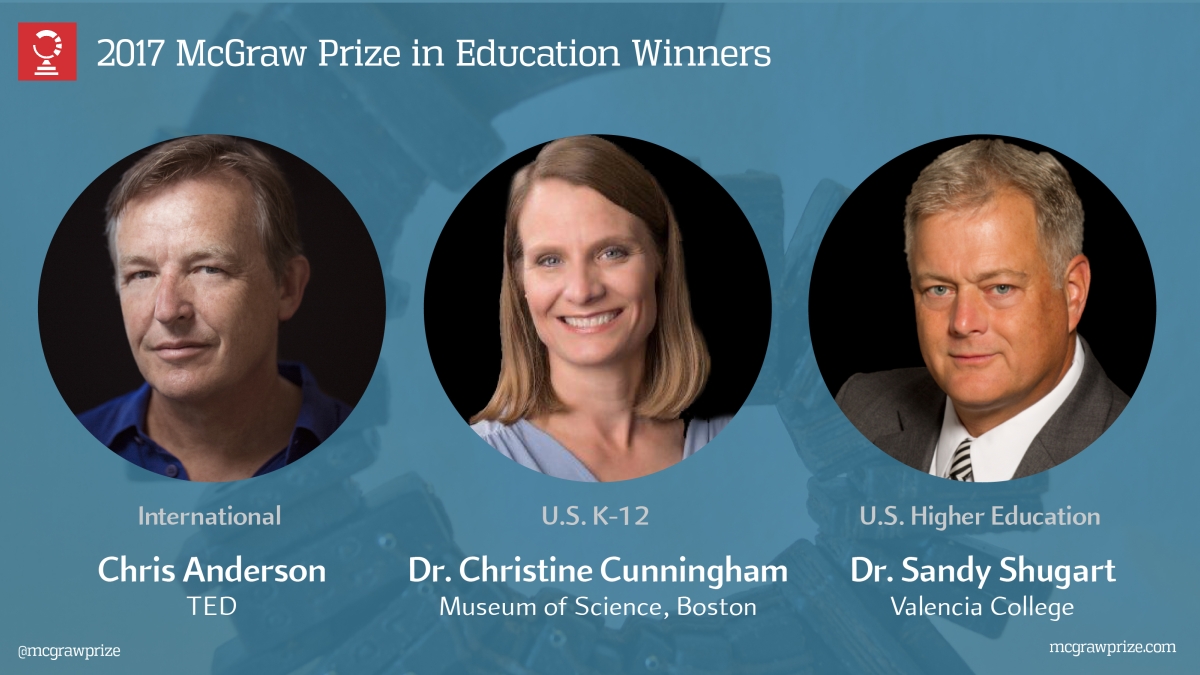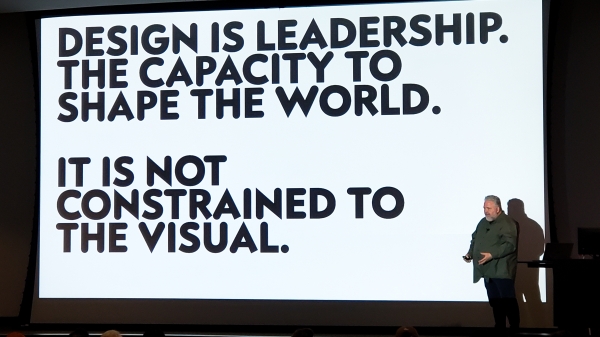Three innovators in education named winners of McGraw Prize in education
Christine Cunningham, Sandy Shugart and Chris Anderson win award administered through alliance between McGraw-Hill Education and ASU

Today, Arizona State University and McGraw-Hill Education announced the winners of the 2017 Harold W. McGraw Jr. Prize in Education, one of the most prestigious awards in the field.
The prize, founded in 1988 to honor the retiring former McGraw CEO, recognizes outstanding individuals who have dedicated themselves to improving education through new approaches. It is administered through an alliance between McGraw-Hill Education and ASU, an alliance that began in 2015.
The winners were recognized in three categories — U.S. K-12 Education, U.S. Higher Education and International Education — and will each receive an award of $50,000 and a McGraw Prize bronze sculpture.
The 2017 McGraw Prize winners are:
- Christine Cunningham: The founder and director of Engineering is Elementary (EiE) at the Museum of Science in Boston is receiving the U.S. K-12 Education prize for pioneering a curriculum that is transforming education by introducing engineering concepts and practices at the elementary level.
- Sandy Shugart: The president of Valencia College is receiving the U.S. Higher Education prize for demonstrating a stellar model of community college change that is increasing graduation rates and helping large numbers of Hispanic students succeed.
- Chris Anderson: The curator of TED, the nonprofit that produces TED Talks, is receiving the International Education award for providing a platform that brings ideas and inspiration to millions of learners around the world and to teachers and students in classrooms.
A prize reception will be held at the 2017 ASU GSV Summit in Salt Lake City on May 9, and the winners will be recognized during a keynote at the event on May 10.
“These three educational leaders are inspiring examples of how passion, hard work and an innovative spirit can combine to create tremendous results,” said Harold (Terry) McGraw III, former chairman and CEO of the McGraw-Hill Companies. “We’re proud to honor them as we have so many other illustrious McGraw Prize in Education winners over the years.”
“Through their leadership and creative vision, Christine, Sandy and Chris have opened doors of opportunity for millions of learners and helped change lives,” said David Levin, president and CEO of McGraw-Hill Education. “By honoring them with the McGraw Prize in Education, I hope their stories reach many more people and inspire others to make a difference.”
“These winners are exemplars in education, advancing ideas and initiatives that are positively impacting students and teachers around the world,” said ASU President Michael M. Crow. “ASU is honored to partner with McGraw-Hill Education to continue to shine a light on innovators who are changing the education landscape as we know it.”
Winners of the McGraw Prize were chosen from among the hundreds of nominations accepted from the public through the McGraw Prize website: www.McGrawPrize.com. Finalists and winners were chosen by a distinguished group of jurors.
Introducing engineering young: Christine Cunningham
Cunningham, founder and director of Engineering is Elementary (EiE) at the Museum of Science in Boston, pioneered an engaging elementary engineering curriculum that bridges the research world and the realities that teachers face day to day. Her highly innovative project is transforming education by introducing engineering concepts and practices to elementary children. She believes schools should “Innovate for the future — but design for the classrooms of today.” Since 2004, her curriculum has been implemented in all 50 states and the District of Columbia, with access to populations underserved and underrepresented in STEM fields. Cunningham's curriculum has reached 12.8 million children and an estimated 1.25 million educators.
Cunningham has received awards for her work from the American Society for Engineering Education and the International Society for Design and Development in Education, among others. In 2015, the American Association of School Librarians awarded EiE the "Best Website for Teaching & Learning Award." She has given keynote addresses at a number of national conferences and testified before Congress on "Harnessing the Power of Engineering to Improve K-12 STEM Education.” Cunningham has elevated elementary engineering instruction through inquiry-based learning as a subject of national importance.
Promoting academic success for Latino students: Sandy Shugart
Shugart is president of Valencia College, a public college in Orlando with 65,000 students on five campuses. He has transformed his institution by focusing on best practices of student success. Valencia enrolls and advances large numbers of Hispanic students and is cited as a stellar model in community college change, with proven results. From 2006 to 2014, Valencia has witnessed an 83 percent increase in the number of students who earn an A.A. degree each year.
In fact, Valencia ranks fourth in the country among colleges and universities in the number of associate degrees awarded. Its associate degree graduates now gain automatic entry into the University of Central Florida, and one quarter of UCF’s graduates are now transfers from Valencia. Valencia has received the Aspen Prize for Community College Excellence and ¡Excelencia in Education! for its promotion of academic success for Latino students.
Spreading ideas to youth: Chris Anderson
Anderson is "curator" of TED, the nonprofit organization devoted to Ideas Worth Spreading. Anderson helped turn what was once a closed-door conference devoted to Technology, Entertainment and Design into a global platform for spreading ideas across a wide variety of disciplines. Founded in 1984, the first TED conferences were held in Monterey, California. In 2006, Chris and his team experimented with putting TED Talk videos online for free — a decision that opened the doors to a radically new model for sharing ideas: Today there are more than 2,100 TED Talks available for free on TED.com, which are viewed about a billion times a year. Thanks to the support of thousands of volunteer translators, there are more than 86,000 published translations of TED Talks in more than 110 languages.
TED’s youth and education initiative TED-Ed aims to spark and celebrate the ideas of teachers and students around the world. TED-Ed includes a growing library of original animated videos, an international platform for teachers to create their own interactive lessons, a curriculum for presentation literacy skills and a global network of more than 250,000 teachers.
For updates on the prize and news from past winners, follow McGraw Prize on Twitter at @McGrawPrize or go to the McGraw Prize website: www.McGrawPrize.com.
The 2017 jurors were: K-12 Education: Yvonne Chan (serving as lead juror), founder and principal of Vaughn Learning Center; Alberto Carvalho, 2016 K-12 Education Prize winner; superintendent of Miami-Dade Public Schools, Mark Edwards, senior vice president of Digital Learning at Discovery Education; Nancy Grasmick, co-director of the Kennedy Krieger Institute; Gerry House, president of the Institute for Student Achievement; John Merrow, former president of Learning Matters and education correspondent; Linda Roberts, national consultant, senior adviser and board director.
Higher Education: Robert Feldman (serving as lead juror), deputy chancellor, University of Massachusetts – Amherst; Richard DeMillo, executive director for 21st Century Universities, Georgia Tech; Rufus Glasper, president and CEO, the League for Innovation in the Community College; Diana Natalicio, president, the University of Texas at El Paso; Jeff Selingo, author, columnist and speaker; Philip Uri Treisman, executive director, the Charles A. Dana Center, the University of Texas at Austin.
International Education: Andreas Schleicher (serving as lead juror), director for the Directorate of Education and Skills, the Organisation for Economic Co-operation and Development (OECD); Valeria Brabata, program director for Latin America and the Caribbean, Global Fund for Women; Edward Byrne, president and principal, King’s College London; David Garza, vice provost for Undergraduate Education, Tec de Monterrey; Sir Malcolm Grant, chairman of NHS England Chancellor, University of York; Ian Jacobs, president and vice chancellor, University of New South Wales; Mike Keppell, pro vice chancellor of Learning Transformations, Swinburne University of Technology; Pramath Raj Sinha, founding dean, Indian School of Business; founder and trustee, Ashoka University, India.
More Arts, humanities and education

Designer behind ASU’s brand named newest Herberger Institute Professor
Bruce Mau, co-founder and CEO of the Chicago-based holistic design consultancy Massive Change Network, has joined Arizona State…

Small presses dealt big blow
A mighty rumble reverberated throughout the publishing industry late last month with the abrupt closure of a well-known book…

'Living dress' wins Eco-Chic sustainable fashion contest
When Elena Marshall is done showing off her award-winning “living dress,” she’ll bury it in her backyard. The dress, a chic…